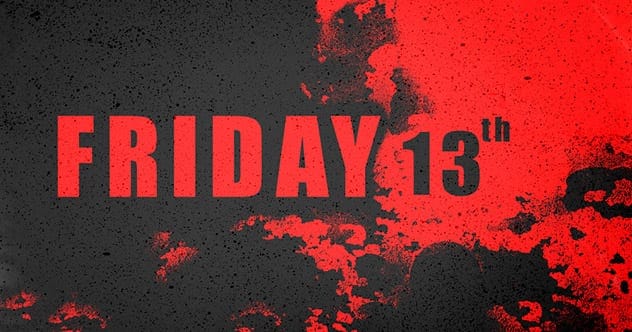Numbers surround us, but beyond their mathematical value, they hold unique cultural significance. Many societies attach specific superstitions to numbers, influencing daily life, business decisions, and personal beliefs. Let’s dive into the world of number superstitions and discover how these beliefs play out in different cultures.
10. Knock on Wood with a Twist

The superstition of ‘knocking on wood’ is a widespread practice to ward off bad luck. In Iceland, this custom comes with an interesting twist. Icelanders say “sjö níu þrettán” (seven nine thirteen) while knocking on wood.
Seven is considered magical because it’s the sum of three (spirit world) and four (material world). Nine is the product of three times three, representing the Holy Trinity. Thirteen is linked back to the old Roman calendar’s unpopular extra month, which was associated with bad luck. Saying ‘seven nine thirteen’ pays homage to both good and bad numbers, balancing fortune.
9. Tuesday the 13th

While Friday the 13th spooks many in the Western world, in Spain, Tuesday the 13th is considered a day to be wary of. Tuesday is associated with Mars, the god of war, and named ‘Martes’ in Spanish after him. This connection infuses the day with connotations of violence and death.
Historically, Constantinople’s fall occurred on Tuesday, April 13, 1204. Legend also says that the ‘Confusion of Tongues’ after the Tower of Babel’s construction happened on Tuesday the 13th. The 13th chapter of Revelation mentioning the Antichrist adds to the day’s ominous reputation, leading to the saying: ‘Don’t marry, go on a boat, or leave your house on a Tuesday.’
8. The Number of Good Fortune and Wealth

In Chinese culture, the number 8 is highly auspicious, symbolizing prosperity and wealth. The association is so strong that it influences real estate pricing, building numbers, and even event dates. For example, a Sydney office building sold for A$88,888,888 in 2016, leveraging the number’s appeal to Chinese developers.
The 2008 Summer Olympics in Beijing began at 8 minutes and 8 seconds past 8 PM on 08/08/08. The Petronas Twin Towers have 88 floors each. A phone number, +86 28 8888 8888, sold for around US$280,000. This widespread preference underscores the cultural belief that 8 attracts good fortune.
7. On the Flip Side

While 8 brings luck in some cultures, the number 4 is often avoided in many Asian countries because it sounds similar to the word for ‘death’ in Chinese and Japanese languages. This fear, known as tetraphobia, has significant implications.
Alfa Romeo once renamed their 144 model car in Singapore due to consumer apprehension. Nokia stopped releasing phone models starting with 4. In Beijing, manufacturing license plates with 4 has been halted, and numerous buildings omit the fourth floor. Combining 4 with 9 (49) in Japan sounds like “pain until death,” making it particularly unlucky. Gifting items in sets of four is also considered highly inappropriate.
6. The Number of the Beast

The number 666 is widely associated with evil, stemming from its mention as the ‘number of the beast’ in the Book of Revelation. This association has led to hexakosioihexekontahexaphobia, the fear of 666. Superstitious individuals often believe it is encoded in banking systems, social security, and even UPC bar codes.
Some people refuse to live in houses with this number or drive until their odometer rolls over from 666 to 667. In the US, Highway 666 was infamously known as the ‘Devil’s Highway’ due to numerous accidents. Ronald and Nancy Reagan even changed their Bel-Air home number from 666 to 668. However, in 2017, Flight 666 flew from Copenhagen, Denmark, to Helsinki (HEL) on Friday the 13th without incident, defying the ominous reputation.
5. It’s All in the Numbers

Numerous superstitions involving numbers exist in Russia. Shaking hands over a threshold, especially on Friday the 13th, is a major taboo, believed to offend the Domovoi, the local house spirit. Russians often spit three times over their left shoulder after complimenting someone’s looks or health to avoid jinxing them.
Eating bus tickets with matching sums on either side is seen as a good luck charm. Newborn babies are kept away from strangers for the first 40 days. Giving even-numbered bouquets of flowers is reserved for funerals and considered bad luck, reflecting deep-rooted folkloric beliefs.
4. Superstition in the Land of Magic

In Ireland, four-leaf clovers are iconic symbols of luck. During the Middle Ages, children believed these clovers allowed them to see fairies and offered magical protection against evil. Beyond clovers, magpies feature prominently in Irish superstitions. A traditional rhyme dictates whether encountering a magpie brings sorrow or joy based on their number:
“One for sorrow, two for joy
Three for a girl and four for a boy
Five for silver, six for gold
Seven for a secret never to be told.”
Greeting a solitary magpie through a salute breaks potential curses. Additionally, counting cars in a funeral procession is avoided, as it supposedly reveals the number of years one has left to live.
3. Friday the 17th

While Friday the 13th is infamous in many cultures, Italians consider Friday the 17th a day of bad luck. Seventeen is seen as unlucky, while 13 is considered fortunate. Folk beliefs suggest the Great Flood occurred on the 17th day of the second month and that Jesus was crucified on a Friday, compounding the day’s negative associations.
November 2nd, All Soul’s Day, increases the day’s ill omen when it falls on a Friday the 17th, with November being called the ‘month of the deceased.’ To counter the curse, Italians carry lucky charms like red horn pendants or images of hunchbacked men, following the saying: “Not on Friday, nor on Tuesday one marries, one leaves, or one starts something.”
2. 13 – Unlucky for Some

In New Zealand, superstitions surrounding houses bring unique twists. When moving into a new home, it’s customary to walk through each room with bread and salt. Guests often bring salt and coal as well.
To prevent fires, some bury a jar containing a virgin’s shirt in the garden, though this practice is now rare. Interestingly, the number 13 can affect real estate values. In Auckland, homes with the number 13 were valued significantly lower than others in areas like Mission Bay and Orakei. However, in Glendowie and Northcote, No. 13 houses were valued higher, showcasing how local beliefs can vary.
1. What’s Up with the Number 23?
The number 23 has a peculiar following, with enthusiasts known as 23rdians forming dedicated groups. William Burroughs, allegedly met a sea captain whose ship sank after boasting about 23 years of accident-free sailing. That same night, Burroughs heard a news report of Flight 23 crashing in Florida, with the pilot sharing the same name as the captain, Clark.
John Forbes Nash Jr, a Nobel Prize-winning mathematician, was fascinated by 23, considering it his favorite prime number. This number is believed to allude to tragedy; for example, the Twin Towers attack on 9/11/2001 sums to 23 (9+11+2+0+0+1). Similarly, Julius Caesar was reportedly stabbed 23 times, and the birth and death years of Kurt Cobain (1967 and 1994) each sum to 23, solidifying its ominous status.
From warding off evil with specific phrases to manipulating real estate markets, numbers wield considerable superstitious power globally. Whether it’s avoiding certain days or embracing lucky digits, these beliefs continue to shape our world in fascinating ways.
What are some number superstitions you’ve heard of? Leave your comment below!










